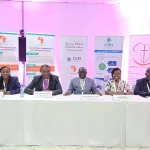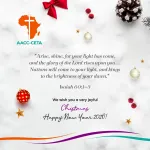AACC convenes African Youth leaders to address challenges of irregular migration, human trafficking and modern slavery
In its quest to preserve and protect human dignity, the AACC empowers its members to address the root causes of irregular migration, human trafficking and modern-day slavery through creating awareness on the challenge, promoting psychosocial support for survivors and pushing for proper migration policies to be developed at all levels.
To advance youth agency in these efforts, the AACC has convened fifty All Africa Youth Network members in Cotonou, Benin for a three-day consultation aiming at creating a youth working group against irregular migration, human trafficking and modern slavery.
This timely gathering was opened on 3rd September 2024, by the Director for AACC’s Regional Office in Lomé, Rev Angele Dogbe. In her remarks, she noted that much as Migration is a phenomenon as old as the human race, the phenomenon becomes worrying with the element of irregular migration which leads to smuggling, trafficking in persons, and modern slavery with their negative implications on human rights and dignity.
“We are witnessing young African migrants undertaking deadly journeys in an effort to reach Europe, the Middle East, the Gulf countries in search of greener pasture or better living conditions,” she said.
“It is our hope that this consultation will help the African youth leaders, CSOs, FBOs, the diaspora dealing with migration and African governments to develop effective and practical strategies to end irregular migration, human trafficking and modern slavery; as we strive to build the Africa we Want through our Pan-African campaign on the Africa: My Home. My Future.” She expressed.
On the onset of the consultation, the participants celebrated the Republic of Benin for leading by example in pursuing the vision for the Africa we want by removing visa restrictions to Africans visiting the country.
“My travel here was a taste of the visa free Africa for Africans that all of us seated here yearn for.” Affirmed Jisreel Emil Naruseb from the Council of Churches in Namibia.
During the three days, theological reflections, insightful conversations and lectures led by a team of facilitators composed of church leaders, AACC staff, and experts from government and non-government agencies on migration will be punctuated with sessions of learning from various survivors of human trafficking and modern slavery.
[In the photo: Group photo of the participants. Courtesy - Muyunga Brian]




